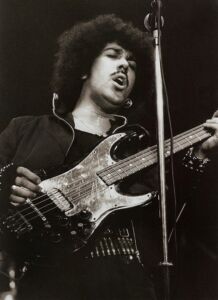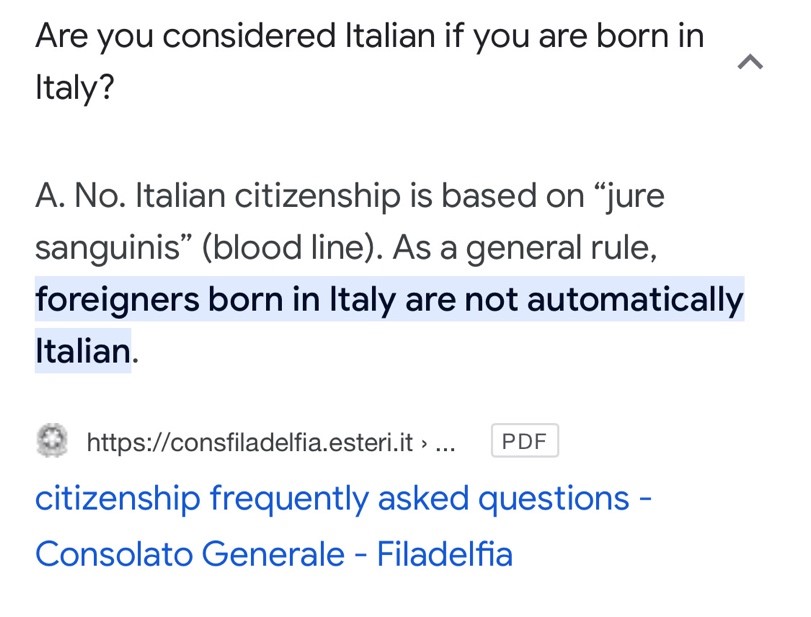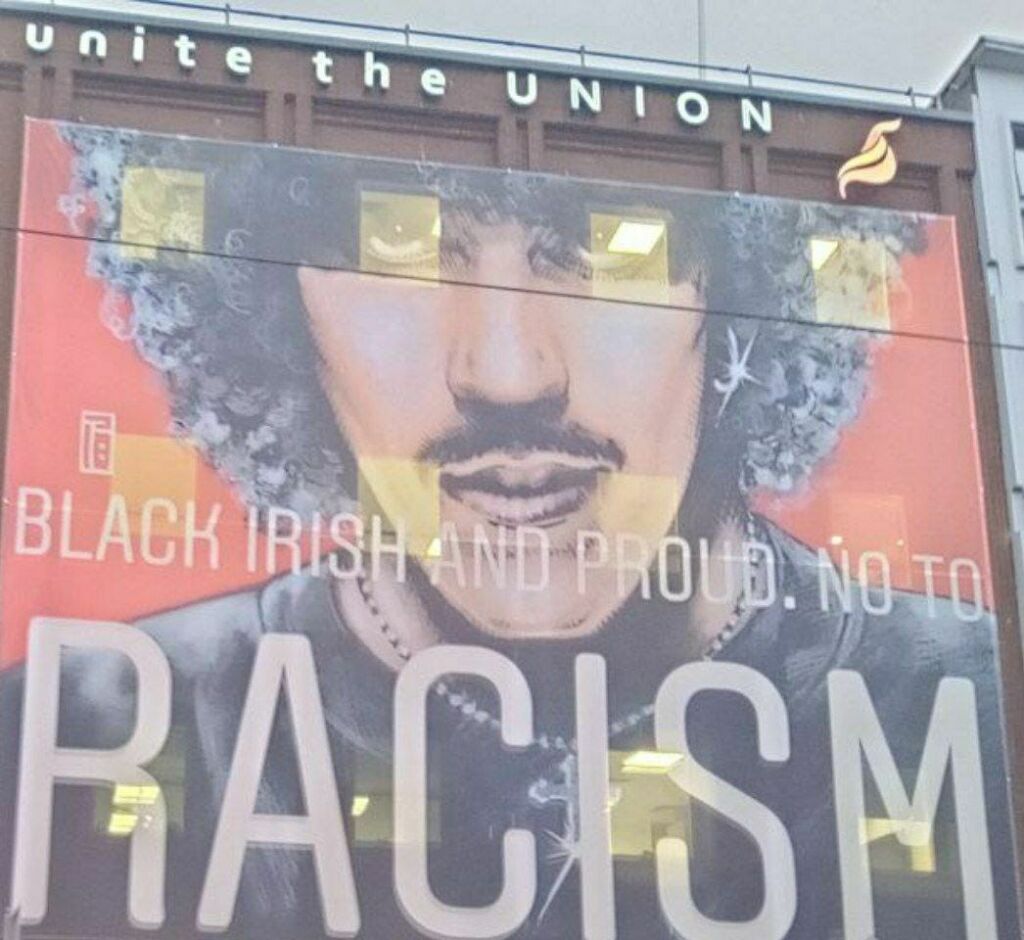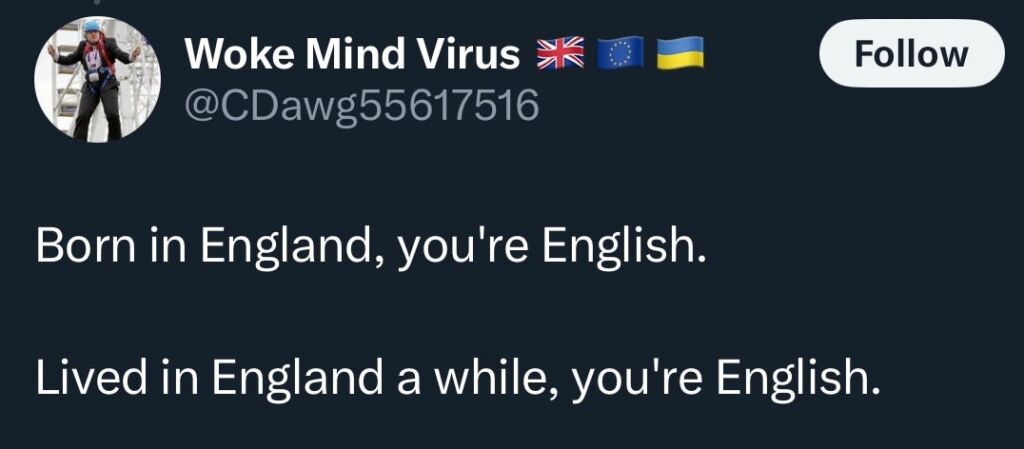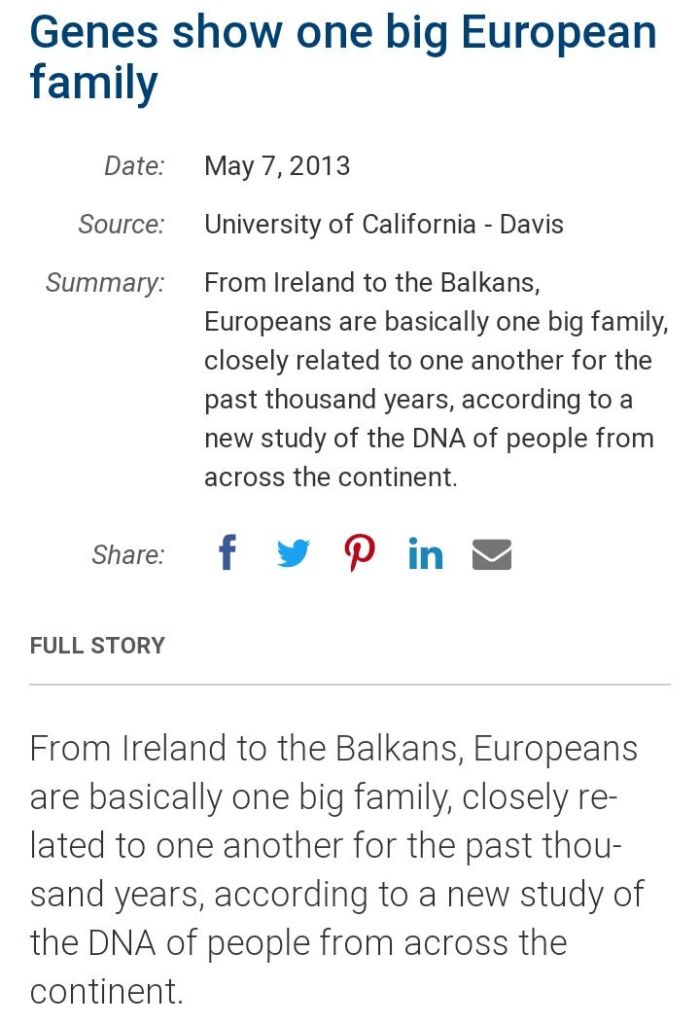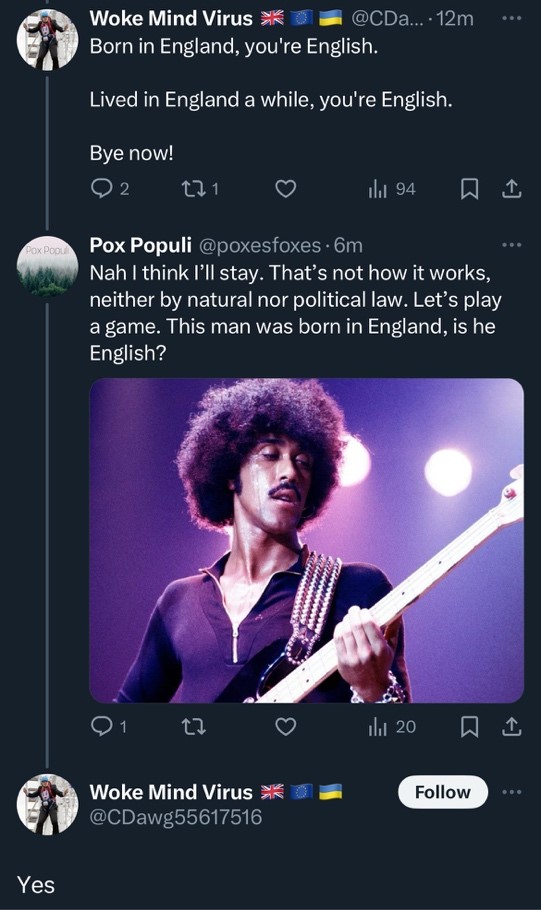The Phil Lynott Conundrum
2,921 words
My father is Italian. He was born in London in the 1960s. At no point was he ever under the impression that he was English. I assume that no one else, certainly not his Italian parents, considered him to be English, either, regardless of his birthplace. Nor did his parents, my grandparents, believe that by moving to London their ethnicity had magically changed and that they were now English, too. In fact, judging by conversations I’ve had with my Italian grandmother and my uncle, living in England only served to put the differences between Anglo and Italic in starker contrast.
I haven’t had many conversations with my father about his life in London, because when he was still only a small child, not even in double digits, the family moved back to Italy. He doesn’t remember much about his years in dear old Blighty. Amazingly, in spite of the relocations my father, my grandparents, and my uncle always remained Italians.
In the decades since my father’s birth and brief childhood in England, something has changed in the way people think of nationhood and identity. Nowadays one can barely go a day (especially if one spends a lot of time writing, reading, and thinking about nationalism and politics) without hearing or seeing someone express with resolute certainty that if a man is born in England, he is English. Or if a man is born in Sweden, he is Swedish. Etc, etc. I suspect this has something to do with American pop-culture dominance. The Unites States is a jus solis propositional nation and it has been spreading jus solis and propositional nation ideas for a long time.
I recall the time, nearly 20 years ago, when I was spending a weekend in Rome. I was staying at a youth hostel and shared a room with a German. He must have been in his mid-to-late 20s; a bit pudgy, he’d probably be called a soyboy nowadays. We got to talking and at one point, the conversation touched on sociopolitical themes. I will never forget the moment the bespectacled German, sitting on his bed next to mine with a book on his lap, said, “In Germany, we are a nation of immigrants, you know.” I wasn’t even 20 years old, and although back then I had some “conservative” views, I was nowhere near the ethnonationalist I am today. And yet, even then, at that sentence a sense in me tingled and I instantly thought: That sounds just like American propaganda. Why the hell is a German saying Germany is a nation of immigrants?
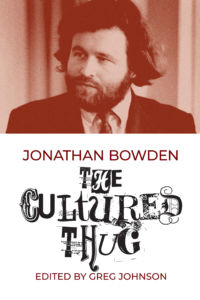
You can buy Jonathan Bowden’s collection The Cultured Thug here.
In fairness, it should be said that Americans are not the only ones to blame. The French, too, have promoted the concept of a nation which can be comprised of many distinct peoples, united by their carte d’indentité. Given that we live in a world, or in a “West,” in which countries so often copy one another’s policies regardless of whether or not the policies might be harmful or are totally inapplicable to other nations, we now have many Europeans mindlessly repeating and believing the same slogans.
On a disturbingly high number of occasions, the people who claim that one’s birthplace determines one’s identity will make it very clear that they are not talking about mere “citizenship,” something which is a political construct and granted by the state. They truly believe that the arbitrary lines on a map within which one is born can determine or change one’s identity. Or rather, they believe that one’s identity can be reduced to a birthplace and citizenship. The fact that “English” refers to a specific, unique, and particular Northwest European ethnic group — or race, as we used to call different peoples until 1946 — does not seem to matter. If you’re born within the territory called “England,” the enchanted soil of that ancient land transforms your genes, your ancestry, and your mother tongue and makes you an Englishman.
This “logic” is not only applied to England. I’ve been told that being born in Ireland makes one Irish, being born in Spain makes one Spanish, being born in Italy makes one Italian, and that being born in France makes one French. It doesn’t matter if one’s family tree hasn’t got a single Irish, Spanish, Italian, or French branch. All European maternity wards are aglow with that same transformative magic that England possesses. It’s truly a mystery how the magic knows how to change an African born in England into an Englishman, an African born just a few miles north of Hadrian’s Wall into a Scotsman, an African born few miles across the Irish sea into an Irishman, and an African born a few miles south of the English Channel into a Frenchman.
Time and again the assertion is made: If you’re born in [insert European country here], you’re [insert European ethnicity here]. The fact that that many of these European countries do not employ a jus solis system — that is to say, citizenship is not granted automatically to a person born in these countries — doesn’t seem to matter to those who make such an assertion. Explaining that even in the countries that do subscribe to jus solis, there is still a very obvious difference between “citizenship” and “ethnicity,” fails to have much of an effect, either. As Irish writer and researcher Andrew Joyce sarcastically put it, “Tens of thousands of years of separate evolution can be undone with a passport and small hand-held flag. Anyone who denies this is an evil lunatic.”
Citizenship is acquired, or given. It can also be revoked, something the non-Europeans who have a European country’s passport tucked inside a drawer should keep in mind. Ethnicity, on the other hand, is biological. It is innate. This latter concept is something that has been understood since the time of Herodotus, when he defined a nation as having, amongst other shared characteristics, shared blood. Unfortunately, we live in an age of astonishing ignorance papered over with even more astonishing arrogance. I once argued with an individual who asserted that any Ngubu-come-lately born in or merely inhabiting Italy was automatically Italian. After I informed him that neither by Italian law nor natural law is this the case, I asked him if he thought that English folks who own holiday homes in Sorrento were Italian, too, to which he responded affirmatively. Throughout the exchange I was branded a “racist” and a “fascist,” and repeatedly assured that I would meet a gruesome and deserved death just like my “dear leader” Mussolini, proving Andrew Joyce’s point.
Many of you reading this will have experienced similar encounters. For me, they occur so frequently as to be a boringly predictable waste of time. Often I find myself wanting to say, “No, this woman from Nigeria is not Irish. Now let’s skip to the part where you say she was born here, I inform you that being born in Ireland doesn’t make her Irish, either, you call me a racist, and then storm off.”
This is generally the way it goes. Whether in a face-to-face “real life” interaction or online, the discussion usually ends with the believer in magic soil either huffing and puffing in resignation disguised under disdain for me, or with an attempt to change the subject — or if we’re on social media, with a tirade of insults and laughing emojis betraying anger and insecurity, ultimately followed by a final declaration that I am a “racist” and a block.

You can buy Greg Johnson’s White Identity Politics here.
Lately, however, I have discovered a new ploy which has made these exchanges much more amusing.
I’m not much of a Thin Lizzy fan. I can’t recall a time I’ve ever intentionally put on a Thin Lizzy song. For some reason, I used to confuse Thin Lizzy with T-Rex. That explains why it’s taken me so long to “discover” this new tactic which has brought fresh mirth to my arguments with believers in magic soil — or “Birthers,” we might call them.
Thin Lizzy is the name of a rock band from Dublin. The lead vocalist, bass guitar player, and main songwriter was Phil Lynott. Phil Lynott is regarded as one of Ireland’s many famous musical icons. He is beloved. Statues have been put up in his honor. He is also frequently upheld as one of Ireland’s “Black Irish.” No, not the black Irish of dark hair and smokey eyes. The term has been culturally appropriated and now refers to Africans who call themselves Irish and demand everyone else do the same, with a significant number of native Irish all too willing to oblige. Whenever an Irishman objects to his homeland being used as a dumping ground for more and more Africans, Arabs, Indians, Afghans, and the like, it is almost guaranteed that some Irish progressive will evoke the name Phil Lynott and proclaim that good Phil is a shining example of “diverse” Ireland, and indeed, more Irish and a better Irishman than the small-minded Paddy complaining about mass immigration.
Phil Lynott was born to Philomena Lynott and Cecil Parris, the latter a black man from British Guyana. After reading Philomena’s Wikipedia biography, I came away with the impression that she was probably not a very good mother, and very likely the kind of self-centered, irresponsible Western woman that has become typical today. She did not marry Cecil Parris. She sent baby Phil to Dublin so her parents could raise him. She would go on to have two other children and give them up for adoption. She only saw Phil, according to Wikipedia, “sporadically” and was not present at Phil’s bedside when he died in a hospital in Salisbury, England at the age of 36. Despite this, she seems to have taken full advantage of her son’s fame for her own personal gain.
But enough about Philomena. Her son Phil died in a hospital in England, which is fitting because he was born in a hospital in England, too. And therein lies the conundrum.
As we have seen, the recurring claim is that if someone is born in England, that someone is English. Both racial aliens living in England and their progressive-minded native English defenders make this claim. Well, “Irish” rock star Phil Lynott was born in West Bromwich. That’s in England. Therefore, according to the rules of Magic Soil nationhood, Phil Lynott cannot be Irish. He was born in England. He is English. Sorry, Ireland.
Phil’s father was a black man from British Guyana (so, not an Irishman). His birthplace was England. And to add further intrigue to the tale, the surname Lynott derives from a Gaelicization of a Norman family name which came to Ireland in the twelfth century with the Norman invaders. This is a significant detail. Now that Ireland has been subjected to replacement migration, the meaning of Irish identity has become more important than ever. Open-borders-supporting, refugee-welcoming (but never housing), smug cosmopolitans love to deconstruct European nationalities. In Britain, they will insult any native Brit who is aghast at the multiracial dystopia his country has become by asking in mocking tones, “Why do you care? What does British even mean? We’re mongrels. A bit Saxon. A bit Celt. A bit Norman.” While attempting to argue that a Pakistani is British, these types will also assert, erroneously, that the British have Roman ancestry, too. This claim is then followed by another erroneous claim, which is that the Roman invaders were “brown” or had “black” (meaning, Sub-Saharan Africans) soldiers in their ranks, therefore justifying the ever-increasing presence of blacks in Britain today.
Similar deconstructionist attempts are now being waged on the Irish. If Paddy objects to the notion that a Sub-Saharan African or a woman from China is “just as Irish” as him, the deconstructionist will scoff, “Well, why can’t Hazel Chu be Irish? Are you 100% Gaelic? You probably got a bit of Danish in you. Your surname’s Roche? Isn’t that French? Who’s really Irish anyway? How far back do you have to go to be real Irish?” This is rather like looking at a cake and saying there is no cake because the cake is made of eggs, flour, and sugar. It also shows no regard for the fact that European “ethnicities” derive from the European race, of which Sub-Saharan Africans and Chinamen do not form a part. Modern Europeans descend from but three prehistoric “tribes.” It is a big leap to say that, because a few genetically and linguistically similar Northwest European descendants of those tribes mingled over the centuries, populations from entirely different continents can lay claim to our ethnic identity, and that we have no choice but to accept an endless number of them moving to our countries. It’s also a deconstruction that no non-European nation or race ever faces.
The deconstructionist should be made to answer, “In what way can Phil Lynott be ‘Irish’?” He wasn’t born in Ireland, so he missed out on the magic soil; his father was from British Guyana; and going by his mother’s surname, she descended from Norman settlers. According to the deconstructionist’s own standards, Phil Lynott isn’t really Irish, either. If Paddy Roche has to suffer gaslighting and having his Irish identity questioned, then the same surely goes for Phil Lynott, the half-black half-Norman born in England.
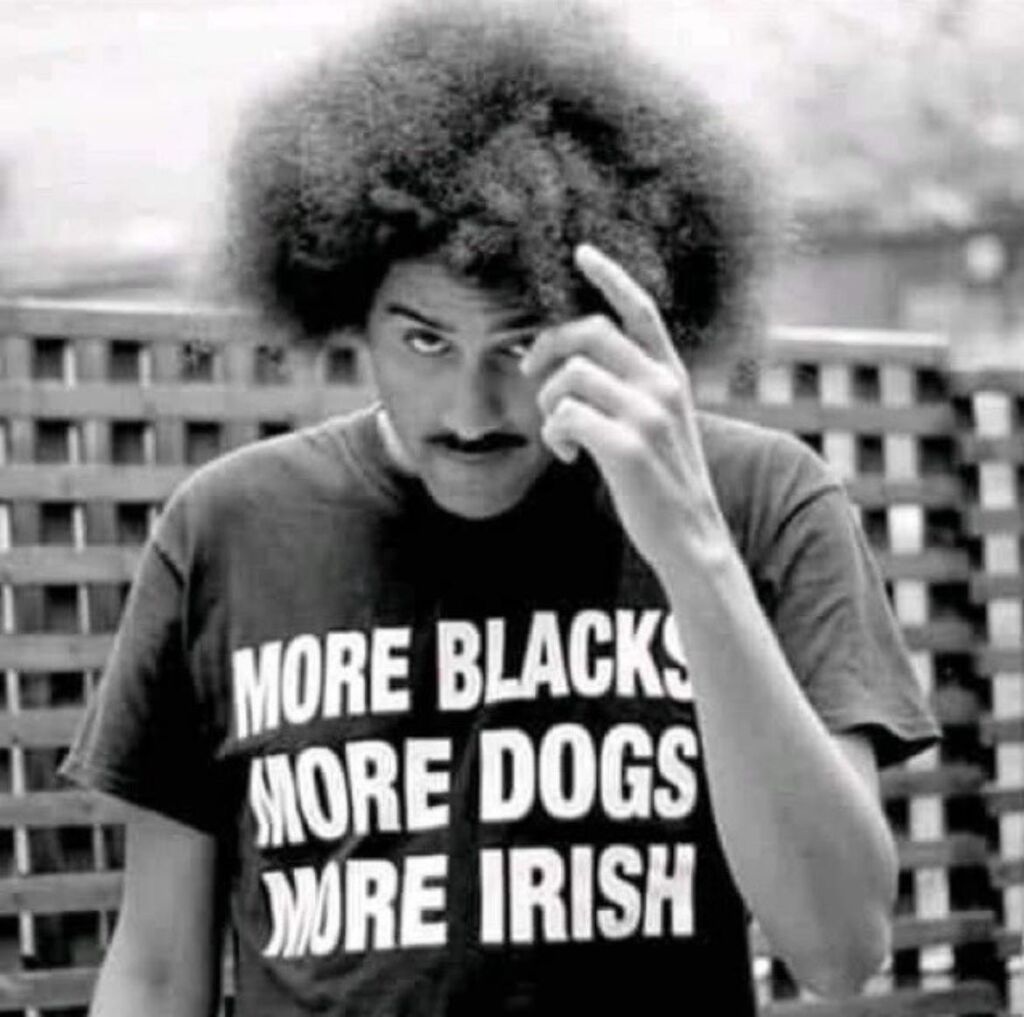
Allegedly, a sign was once put up reading “No” to the three things listed on Lynott’s t-shirt. The sign may not have existed, in actual fact, making this slogan a play on something that was never said. But the truth doesn’t matter.
Left to the deconstructionists, Phil Lynott would be an Irish icon simply because he lived in Ireland for a bit. In fact, if being born within certain boundaries, and/or relocating, and/or signing some paperwork to get a passport all determine and even change the ethnic group to which one belongs, then there’s really no way to say what anyone’s ethnicity is until they’re dead. Such reductio ad absurdum is the end result of ethnic deconstructionism.
Something else that almost always occurs with predictable reliability in these discussions is that the ethnic deconstructionist will say that we all come Africa, anyway — even though the theory that all humans originate from a single ancestor which lived in Africa is highly contested — and therefore there can be no such thing as race or nations. We’re all exactly the same. Although, somehow we are also “diverse.” White countries aren’t diverse enough, so non-white people — who are not of different races because we’re all the same — must come and live in white peoples’ societies in order to add more diversity. This is what we’re supposed to believe.
What makes the Phil Lynott conundrum especially enjoyable is when someone doesn’t know who he is.
In the context of British or Irish identity and nationalism, the Phil Lynott conundrum is useful in highlighting the absurdity of the modern liberals’ ideas that they would like to impose on us forever. Of course, its utility only goes so far. As noted earlier, these exchanges rarely result in the Birther and smug European deconstructionist having a change of mind. They hate getting knocked down a peg. Thinking themselves so clever, to have their lack of intelligence exposed causes a grievous wound.
The Phil Lynott conundrum is mostly an amusing rhetorical trick question. It would all be capricious fun were it not for the fact that the insanity that has us stuck in its grip poses a very real threat to the existence of Europeans. As the world lurches toward the “globalist utopia” and European leaders on the whole show no signs of wanting to reduce immigration and repatriate non-Europeans — in fact, they show signs of wanting to do the opposite — these questions of identity will become more prominent in all aspects of life. One only needs to observe the tiresome controversies that erupt during the football World Cup or European Cup, when European nations field teams full of non-Europeans. Anyone who dares to say that the Africans on the pitch aren’t real [insert European nationality here] is more and more likely to face a hate-speech charge or some other Orwellian indictment. Indeed, if you really want to put the Phil Lynott conundrum to the test, find yourself some football fans and tell them their favorite black footballers aren’t really English, Irish, French, Italian, etc.
What’s curious about the enraged reaction you’re bound to get, especially from the non-whites themselves, is how much they want to have their cake — which after all is just a mix of flour, eggs, and sugar — and eat it. These interlopers, aided by their obsequious white liberal “allies,” will take every opportunity to wear our European identities as a skin-suit, daring anyone to suggest that they are not “just as” English, French, Swedish, or whatever nation is being subverted. Yet so often, the mask slips. When push comes to shove, as when the possibility arises that they might be conscripted to fight for the European nation they claim to be a part of, suddenly they are Nigerian again. Or Jamaican. Or Algerian. Or Pakistani. Or maybe they simply aren’t self-aware and intelligent enough to notice how hypocritical they are.
The modern liberal world order is built on lies. From the founding myth of the heroic Allies of the Second World War, to the mantra “Diversity Is Our Strength,” to passport nationalism and magic soil, to the “natural flavors” label on the processed food lining the supermarket aisles, lies are an inescapable feature of our every waking moment.
But maybe it won’t be long before the boys are back in town, bringing some much-needed truth with them.

